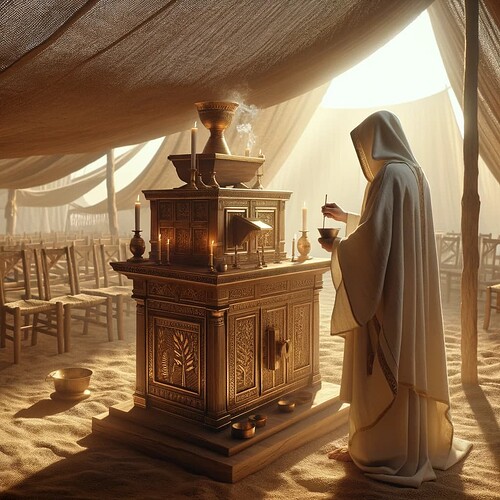![]() February 19: Exodus 30 - Cultivation of Sacred Connection
February 19: Exodus 30 - Cultivation of Sacred Connection
![]() Introduction
Introduction
In Exodus 30, the Israelites are instructed on the creation and use of the sacred altar of incense, the census tax, basin for washing, anointing oil, and sacred incense. These detailed codes regulate the rituals for maintaining the sacred connection with God.
![]() The Sacred Altar
The Sacred Altar
Here, we are introduced to the altar of incense, its physical design and detailed instructions regarding its use. Complementary to the use of burnt offerings, this represented a powerful symbol of prayer and plea.
![]() Key Verse: “Aaron must burn fragrant incense on the altar every morning when he tends the lamps.” (Exodus 30:7)
Key Verse: “Aaron must burn fragrant incense on the altar every morning when he tends the lamps.” (Exodus 30:7)
![]() The Atonement Money
The Atonement Money
The census and accompanying atonement money is discussed. This created a sense of responsibility and communal commitment to service, regardless of social or financial status.
![]() Key Verse: “When you take a census of the Israelites to count them, each one must pay the LORD a ransom for his life at the time he is counted.” (Exodus 30:12)
Key Verse: “When you take a census of the Israelites to count them, each one must pay the LORD a ransom for his life at the time he is counted.” (Exodus 30:12)
![]() Key Themes and Reflections
Key Themes and Reflections
- Prayer: The altar of incense represents our prayers as rising incense- soothing aroma to our God. It is a reminder for us to anchor daily life in prayer.
- Sacred Connection: The sacrificial offering and the meticulous care commanded for the altar symbolizes maintaining a holy commune with God.
- Community Building: The census tax shows the responsibility of each individual towards the community.
![]() Today’s Application
Today’s Application
Apply the teachings of this chapter to your daily life by cultivating a consistent prayer life, maintaining a strong connection with God, and encouraging community involvement and support.
![]() Hidden Gem
Hidden Gem
The anointing oil & incense formula was exclusive for holy purposes, thus instructing against the misuse of holiness.
![]() Reflective Q&A:
Reflective Q&A:
![]() What is the significance of the incense altar?
What is the significance of the incense altar?
A: It represents prayer and how it is uplifting, relational, and reverent in nature.
![]() Can the concept of the census tax be applied today?
Can the concept of the census tax be applied today?
A: Yes, it signifies that all have equal and essential roles in the community and spiritual growth.
![]() What does the use of anointing oil symbolize?
What does the use of anointing oil symbolize?
A: It symbolizes consecration, spiritual preparation, and divine approval.
![]() Join the Discussion
Join the Discussion
Share your personal reflections and lessons from today’s reading.
![]() See You Tomorrow in Exodus 31, 32
See You Tomorrow in Exodus 31, 32
Take away a deeper understanding of sacrificial giving. Explore the empowered craftsmen filled with wisdom and skill by God’s Spirit in Exodus 31, and a grave misstep in Exodus 32.
Exodus 30 encourages us to maintain a lifestyle of consistent prayer, foster a sacred connection with God, and commit to community service. How apt in a time when the world needs prayerful intercession, holy connection, and communal service.
